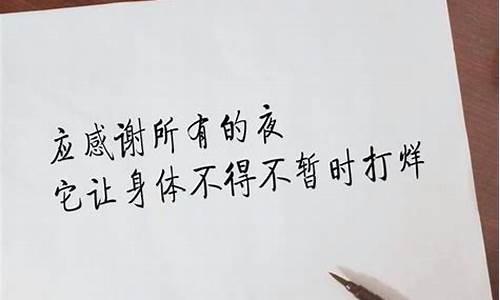您现在的位置是: 首页 > 情感语录 情感语录
英语对话句子怎么写_英语对话咋写
tamoadmin 2024-09-05 人已围观
简介1.英语日常对话句子2.常用英语对话的句子有哪些?3.英语对话,两人对话,2分钟左右,急,不需要太复杂的句子,要求如下4.急求一段英语两人对话 不少于10个来回 20个句子 速度来英语对话常用句子如下:1、Hello / Hi / Hey / Hey man!这几个都是非常随意的打招呼方式。其中hello和hi通用于各种轻松场合,而hey主要用于熟人之间。2、How are you? / How
1.英语日常对话句子
2.常用英语对话的句子有哪些?
3.英语对话,两人对话,2分钟左右,急,不需要太复杂的句子,要求如下
4.急求一段英语两人对话 不少于10个来回 20个句子 速度来

英语对话常用句子如下:
1、Hello / Hi / Hey / Hey man!
这几个都是非常随意的打招呼方式。其中hello和hi通用于各种轻松场合,而hey主要用于熟人之间。
2、How are you? / How are you doing? / How’s it going?
"How are you?"是我们熟悉的问候方式,用于认识的人之间,意思是“你好吗?”“你怎么样?”,语气相对比较客气,一般回复的方式是"Fine, thank you, and you?"
如果是和老朋友打招呼,人们则常常会用"How are you doing?"或者"How's it going?"。
前者是"How are you"的随意版本,回答方式是"I'm doing well (, and you?)"。
后者意思比较接近“最近怎么样?”,回答方式是"It's going well (, and you?)"。口语里人们有时会将going简化为go-in。
3、How's everything? / How are things?
同样是"How are you"的替代方式,意思和"How's it going"基本一致,指“最近一切都好”?
4、How's your day? / How's your day going?
这一句一般是下午或者晚上问候的方式,意思是“你今天怎么样?”,一般用于经常见面的人之间。
5、Good to see you / Nice to see you。
一种轻松的问好方式,意思是“见到你真高兴”,用于一段时间不见的朋友、同事或者家人之间。
6、Long time no see / It's been a while。
意思是“好久不见”,同样用于一段时间不见的熟人之间,特别是当你们是偶遇的时候。
英语日常对话句子
中:hello,nice to meet you!
外:hello, nice to meet you too.
中:Where are you from?
外:I am from USA.
中:oh, great!It is a beautiful country.
外:Thanks
中:Bye!
外:Bye!
常用英语对话的句子有哪些?
英语日常交际用语
1.问候 Greetings
(1)Good morning(afternoon,evening)早上好(或:下午、晚上)好
Hello.你好(或:喂)
Hi.你好(或:嗨)
--How are you?你好吗
--Fine,thank you,and you?(very well,thank you.)好,谢谢,你也好吧?或:很好,谢谢你
(2)Best wishes(regards) to sb.问候汤姆好
Please give my regards(best wishes,love) to Tom.请代我向汤姆致以问候
Please remember me to Tom.请代我向汤姆问候
Say hello to Tom.向汤姆问好
(3)Glad(Pleased) to meet you here(again).很高兴在这里(或:又)见到你
2.介绍 Introductions
(1)This is Mr(Mrs,Miss,Ms) Green.这位是格林先生(或:夫人、**、女士)
This is Comrade Li Ning. 这位是李宁同志
May I introduce you to my friends?我来把您介绍给我的好朋友好吗?
I'd like you to meet Mr Green.我想请您见见格林先生
(2)--How do you do?(初次见面时用)您好
--How do you do?您好
Nice(Glad,Pleased) to meet(see) you.见到您我很高兴
Nice meeting you,Mr Green.(多用于分手时)格林先生,我真高兴能认识您
(3)My name is Li Ning.我名叫李宁
I'm a teacher.我是老师
I'm Chinese.我是中国人
Excuse me,what's your (full) name,please?请问你贵姓(您尊姓大名)
(4)I he often heard about you.我常常听人谈起你
I he often wanted to meet you.我一直想认识你
Excuse my introducting myself.恕我冒昧地自我介绍一下
Do you know my father?你认识我父亲吗?
I don't think you he met my father.我想你还没有见过我父亲吧
Allow(let) me introduce Mr Green to you.请允许(或让)我给你介绍一下格林先生
3.告别 Farewells
(1)I'm afraid I must be leing(must be off,he to go) now.恐怕我得走了
I think it's time for us to lee now.我想我们该走了
It's time I met Tom(did my homework). I he to go now.(注意从句要用虚拟语气)我该去见汤姆(或:去做作业了).现在我得走了
(2)Good-bye!/Bye-bye!/Bye!再见!
See you later(tomorrow).回头见(或:明天见)
See you.回见
Good night.晚安.再见
4.感谢和应答 Thanks and responses
(1)Thank you (very much).(非常)感谢
Thanks a lot.多谢
Many thanks.多谢
Thanks(Thank you) for listenting.谢谢(收听)
It's very kind of you (to help me).您真是太好了(帮了我的忙)
(2)Not at all.不用谢.不客气
It's(That's) all right.没关系
You are wellcome.不用谢
(3)It's most thoughtful of you.你真是想得太周到了
I don't know how I can thank you enough.我不知怎样谢你才好
I don't knoe what I should he done without your help.没有你的帮助我真不知道怎么办
Thank you all the same.仍然要谢谢你
5.祝愿、祝贺和应答 Good wishes,congratulations and responese
(1)Good luck!祝你好运
I wish you good luck(success)!祝你好运(或:成功)
Good journey (to you)!旅途愉快
He a good trip.旅途愉快
He a nice(good) time.祝你玩得高兴
I'd like to congratulate you on your success.祝贺你的成功
(2)Thank you.谢谢
The same to you.也祝贺你
(3)Hy New Year!新年好!新年快乐
Merry Christmas!圣诞快乐
Hy birthday to you.祝你生日快乐
Congratulations!祝贺你
6.道歉、遗憾和应答 Apologies,regrets,sympathies and responses
(1)Pardon.(这里应读降调,若读升调表示因没听清楚对方的话而希望对方重复一遍)请原谅
Sorry(I'm sorry).对不起
I'm sorry for(about) that.我为此感到抱歉(或:难过、遗憾等)
I'm sorry to hear that.听到这个我很难过(遗憾等)
I'm sorry to he(I'm sorry that I he) kept you waiting fou a long time.抱歉让你久等了
(2)Excuse me(for hing kept you waiting fou a long time).请原谅(让你久等了)
I'm afraid (that) I'll be late.恐怕我要迟到了
What a pity!真可惜!真是遗憾
What a shame!真丢脸
It's a pity that you can't come.你不能来真是遗憾
(3)That's all right.没关系
It doesn't matter.不要紧
That's nothing.没有什么
(4)It was most thoughtless of me.我太卤莽了
I must apologize.我得向你道歉
I really didn't mean that at all.我真的完全没有那个意思
(5)Don't worry about that.不要为那事觉得不安
It really isn't worth mentioning.那真是不值得一提的
Don't think any more about it.别再去想它了
I quite understand.我完全理解
7.邀请和应答 Invitations and responses
(1)Will you come to my birthday party?您能来参加我的生日聚会吗
Would you like to come to my birthday party?您愿意来参加我的生日聚会吗
I'd like to invite you to come to my birthday party.我想邀请你来参加我的生日聚会
(2)Yes,I'd love to (go to your birthday party).好吗,我非常愿意(去参加你的生日聚会)
Yes,I'd love to,but I'm too busy to go.是的,我非常想参加,但是我太忙了,去不了
Yes,i's very kind(nice) of you.愿意.承蒙你的好意.或:你真是太好了
(3)I'd very much like you to join us.我非常希望您能加入我们之中
Shall we he a drink?我们喝点东西好吗
(4)That would be very nice.那太好了
With pleasure.好的
8.提供(帮助等)和应答 Offers and responses
(1)Can(Could,Shall) I help you?我来帮你好吗?或:你要买什么
Would you like me to help you with your lessons?我来帮你做功课好吗
Is there anything (else) I can do for you?有什么(别的)事我能帮你做吗
Do you want me to help you?你想要我帮你吗
What can I do for you?我能为你做什么呢
Let me do it(carry it)(for you).让我来(替你)做(或:搬)吧
Would you like some tea?你想来些茶吗
(2)Thanks.That would be nice(fine).谢谢.太好了
That's very kind of you.你真好
Thank you for your help.感谢你的帮助
Yes,please.好的,请(干)吧
Here,take this(my) bag.给,请帮忙拿这个(或:我的)包好吗
(3)No,thanks(thank you).I can manage it myself.不必了,谢谢.我自己能应付
Thank you all the same.(尽管无需你帮忙,但)还是要谢谢你
That's very kind of you,but I can manage it myself.你真好,但我自己能应付
(4)What a hand (to carry it)?要帮忙(拿)吗
(5)Just what I needed!我正需要呢!
That's be a big help.Thanks a lot.那真帮了大忙了,多谢
9.约会 Making ointments
(1)Are you(Will you be,Do you hen to be) free this afternoon(tomorrow)?今天下午(或:明天)你有空吗
How about tomorrow morning(afternoon,evening)?明天早上(或:下午、晚上)怎么样
Shall we meet at 4:30 at the school gate?我们4:30在校门口见好吗
(2)Yes,that's all right.行,可以
Yes,I'll be free then.行,到时候我有空
All right,see you then.好吧,到时候见
(3)No,I won't be free then.But I'll be free the next day.不行,那会儿我没空,但是第二天我有空
(4)He you got anything to do tomorrow?你明天有事吗?
(At) what time can I see you?我什么时候可以看你
May I expect you at four?我四点钟等你好吗
Up to what time shall you be free?那什么时候你才有空
Shall I call for you or will you come for me?是我来叫你呢?还是你来约我
Wouldn't it be better to come a little later?晚一点儿来不是更好吗
Shall I let you know later?我以后告诉你好吗
Look here;I'll tell you what;you drop me a card this evening and tell me exactly what you've made up your mind to do.听着;就这么办吧;今天晚上你送一张卡片给我,告诉我你到底决定怎么做
(5)Try to come earlier,if you can.如果能够的话,尽量早一些来
I'll look out for you (at) about three.我三点钟左右等你
If you are prevented from coming,will you let me know?如果你不能来,请告诉我一声好吗
Do try to come.一定想办法来吧
Let's make it 8 o'clock.我们约定八点吧
Let's meet at the school gate.我们在校门口见面吧
That'll be fine.Thank you.那好,谢谢
10.意愿和希望 Intentions and wishes
(1)I'm going to start next week.我打算下周出发
I inten(mean,plan) to start next week.我意欲(或:想要、)下周出发
I will do it myself.我要亲自干
I feel like going out for a walk.我想要出去散散步
I'd like to go out for a walk.我想要出去散散步
I (don't) want(hope) to go with you.我(不)愿意(或:希望)和你一起去
I'm ready to go with you.我愿意同你一起去
I would rather not tell you.我真不愿意告诉你
(2)I want(hope,wish) to go with you.我想要(或:希望)和你一起去
I wish that you would go with me.(从句要用虚拟语气)我希望你和我一起去
I would do it if I should he the chance.我若有机会,一定不放过
I would like to go with you.我想和你一块儿去
If only I could see him.(要用虚拟语气)要是我能见上他就好了
11.请求、允许和应答 Asking for permission and responses
(1)May I use your bike?我可以用用你的自行车吗
Can(Could) I use your bike?我能用用你的自行车吗
I wonder if I could use your bike?不知道我能否用用你的自行车
Would(Do) you mind if I open the window?如果我打开窗户,你是否介意(注意答语:"同意打开"用"No"或"Not at all"等,表示不介意;"不同意打开"用"Yes",表示介意)
(2)Yes(Sure,Certainly).可以(或:当然可以)
Yes,(do) please.可以,请(便)吧
Of course (you may).当然(可以)
Go ahead,please.干吧.(或:说吧.走吧.)
That's OK(All right).那行
Not at all.一点儿也不
(3)I'm sorry,you can't.抱歉,不行
I'm sorry,but you can use my bike tomorrow.抱歉,但明天你可以用我的自行车
You'd better not.你最好别这样
(4)You can take that,if you like.可以给你那个,如果你想要的话
Take it,by all means.拿去吧,完全没有问题
Take it,do.拿吧,拿去吧
12.同意和不同意 Agreement and disagreement
(1)Certainly(Sure,Of course).当然可以
No problem.没问题
Yes,please.可以,请(干)吧
Yes,I think so.对,我认为是这样
That's ture.是真的.或:确实是这样
All right(OK).行,可以
That's a good idea.是个好主意(区别:That's the idea."是这个意思!"或"对啦!")
It's a good idea to swim in summer.夏天游泳是个好主意
It's a good idea that we start at once.我们马上出发是个好主意
I(We) agree (with you).我(或:我们)同意(你的意见)
I agree to your plan.我同意你的 (区别:"同意某人"用agree with;"同意某物"用agree to)
I agree to help you.我答应帮你
I agree that this is a good plan.我赞同这是个好
(2)No.I don't think so.不,我认为不是这样的
I'm afraid not.恐怕不是的
I'm afraid I (really) can't agree with you.恐怕我(实在)不能同意你的看法
(3)Yes,just so.是的,正是这样
If you say so.如果你这么说的话,(那我也同意)
Yes.That's just what I think(was going to say).对,那正是我所认为的(或:那正是我想说的话)
I believe(guess,hope) so.我相信(或:猜想、希望)是这样的
There's no dou about it.那是毫无疑问的
(4)I really don't think so.我真的认为不是这样的
I think(believe,hope) not.我认为(或:相信、希望)不是这样的
I don't think you are right there.我认为在这点上你错了
I'm afraid you are mistaken there.恐怕你在这点上弄错了
13.喜好和厌恶 Likes and dislikes
(1)I like(love) English (very much).我(非常)喜欢英语
I like(love) singing.我喜欢(或:热爱唱歌)
I like(love) to sleep late on Sundays.星期天我喜欢睡懒觉
(2)I don't like(I hate) that man.我不喜欢那人
I don't like(I hate) to trouble you.我不愿打扰你
I don't like asking for help.我不愿求人帮助
(3)It's really wonderful.真是太好了
I've enjoyed it so much.我非常欣赏它
It's too lovely for words.这太可爱了,无法用言语来形容
(4)I can't stand(bear) that woman.我受不了那个女人
He may be all right but I don't like him. 他也许不错,但是我不喜欢他
14.决断和坚持 Determination,decision and insistence
(1)I will go there myself.我要亲自去那儿
I he decided to go there myself.我已决定要亲自去那里
I he decided that I will go there myself.我已决定我将亲自去那
I he decided where to place my new desk.我已决定了安置新写字台的地方
I he decided where I should place my new desk.我已决定了我该把新写字台安放到哪里
(2)I insist on our starting at once.我坚持主张我们应该马上出发
I insist that we (should) start at once.我坚持主张我们应马上出发(表示"坚持一个主张"时,要用虚拟语气(should)+动词原形)
I insist that I had not received his letter.我坚持说我没有收到他的来信(表示"坚持一个事实"时,用陈述语气)
15.判断和意见 Judgement and opinion
(1)It certainly is.当然就是
It's crrect to do it right now.马上就干是对的
Well done(Good work)!干得好
(2)In my opinion Tom is the right man.在我看来汤姆是最合适的人选
It seem as if it is going to rain.好像要下雨了
So(As) far as I know,that is possible.就我所知(依我之见),那是可能的
16.职责 Obligation
(1)You must(should,he to,ought to) study hard.你必须(或:得、应该)努力学习
It is necessary for him to do so.他必须这样做
It is necessary that he (should) do so.他必须这样做(从句要用虚拟语气)
(2)I am to see him tomorrow.我明天该去见他
I am supposed to go now.现在我该走了
17.能力 Ability
(1)I can swim.我会游泳
He is able to come.他能来
We shall be able to finish the work tomorrow.我们可以在明天完成这项工作
18.偏爱 Preference
(1)I prefer fish to chicken.我喜欢吃鱼肉剩过吃鸡肉
I prefer walking to cycling.我喜欢步行剩过骑自行车
He'd prefer them (not) to go there.他愿意他们(不要)去那儿
He'd rether begin at once.他宁愿马上就开始
(2)She prefers to be alone.她喜欢独处
I prefer walking alone.我喜欢独自散步
I prefer my coffee black.我喜欢喝不加奶的咖啡
I'd rather walk than take a bus.我宁可走路,也不愿坐公共汽车
19.责备和抱怨 Blame and complaint
(1)He is to blame.他应受责备
She blamed him for the failure of their marriage(She blamed the failure of their marriage on him).她把他们婚姻的失败归咎于他
He shouldn't he done it.他本不该做这事(用虚拟语气)
(2)I'm sorry to he said that,but you were too careless.很抱歉我讲了这些话,但你也太粗心大意了
Why can't you do something about it?
20.肯定和不肯定 Certainly and uncertainly
(1)I'm sure (of that).(这一点上)我很肯定
I'm sure I he done the right thing.我确信自己做得对
(2)I'm not sure (of that).(这一点上)我没有把握
I'm not sure whether(if) I should go with him(whether to go with him).我不太清楚是否应该跟着他去
I dou if(whether) he'll come.我怀疑他是否会来
(3)Perhaps(Maybe).也许吧
(4)There's no dou(question) about it.那是毫无疑问的(或:没有问题的)
It must be.一定是这样
I dare say.我感说
(5)Perhaps so.也许是这样
未完待续.....
[ 本帖最后由 Huven 于 2007-4-15 15:56 编辑 ]
Huven at 2007-4-15 15:59:07
21.禁止和警告 Prohibition and warnings
(1)You can't(mustn't) do that.你不可做那事
If you are late again,you'll be punished.如果你再迟到,你将受罚
You'd better not do it.你最好别做这事
Don't smoke.禁止吸烟
Don't be late.别迟到
(2)Look out!当心!(或:留神!)
Take care!(He a care!)留神!
Be careful!小心!
22.可能和不可能 Possibility and impossibility
(1)He can(may) come.他可能来
It is possible (that) he will be here in time.(It is possible for him to come here in time.)他也许会及时来这儿的
(2)He may not be right.他可能不对
He is not likely(is likely) to come.他不见得会来
It is likely that they will win.很可能他们赢
23.遇见、猜测和相信 Prediction,conjection and belief
(1)He will help you.他会帮你的
(2)I guess that she's baout 30.(I guess her to be about 30.)我想她大概30岁
He must he done it yesterday.他一定是昨天干的这事情
It seems (taht) he is lying.(He seems to be lying.)好像他在撒谎
It looks as if it's going to rain.好像就要下雨
You look as if you slept badly.你看起来好像没有睡好觉
(3)I believe that he is right.我相信他是对的
24.请求 Requests
(1)Can(Will,Could,Would) you do it for me?你能帮我做这事情吗?
Will(Can,Could,Would) you please give me a hand?请你帮我个忙好吗?
May I he your attention?请注意啦!
(2)Please give(pass) me that pen.请给(或:递给)我那支笔
Please wait (here).请(在此)等候
Please wait (a moment).请等(一下)
Please wait (for) your turn.请等着轮到你吧
Please stand in line.请站队.或:请排齐
Please line up.请排起队来
Please hurry.请快点儿
Make sure that the important papers are all right please.务请保证那些重要文件的安全
Make sure of the time and place.把时间、地点弄清楚
(3)Don't rush(hurry).别急
Don't crowd.别挤
No noise,please.请勿喧哗
No smoking,please.请勿吸烟
25.劝告和建议 Advice and suggestions
(1)You'd better (not) go there.你最好(别)去那儿
You should(ought to) put on more clothes.你应该多穿点衣服
You need (to buy) a new coat.你需要(买)件新上衣
I suggest that he (should) start at once.我建议他立刻出发
(2)Shall we start at once?我们立刻出发好吗?
Let's go to school together.咱们一起去上学吧
What(How) about a cup of tea?来杯茶怎么样?
Why not try again?为啥不再试试?
Why don't you try again?你为啥不再试试?
(3)Would you like to try?你想试一试吗?
What do you say to he lunch?去吃午饭好吗?
Suppose you ring me up.你打电话给我,怎么样?
26.许诺 Promises
(1)I promise (you) a quick answer.我答应(你)从速答复
I promise (you) that I'll help her.我答应你我将帮助她
You shall he the book tomorrow.你明天就可以得到那本书
I will give my bike to you.我将把我的车子给你
27.提醒 Reminding
(1)Don't forget to take a raincoat with you.别忘了要随身带上雨衣
Don't you remember the days when we first met in Beijing?难道你想不起来我们在北京首次相识的那些日子了吗?
Make sure that everything is OK now.看一看是不是一切都好了
28.表示焦虑 Expressing anxiety
(1)What's wrong?怎么啦?出什么毛病啦?
What's the matter (with you)?(你)怎么啦?
Is there anything the matter?出毛病了吗?
I'm(He's,She's) worried about the baby.我(或:他、她)真(为这小宝宝)着急
Oh,what shall I(we) do?我(或:我们)该怎么办?
We were all anxious about her safety.我们都为她的安全而担心
29.表示惊奇 Expressing surprise
(1)Really?真的?
Oh dear!(Dear,dear!)(Dear me!)呵!哎呀!
Is that so?真是这样吗?
Good heens!(Heens!)天哪!
30.表示喜悦 Expressing pleasure
(1)I'm glad(pleased,hy) to hear that.听到这个我非常高兴
That's nice(wonderful,great).这真好!(或:这真妙极了!这真了不起!)
Hopefully tomorrow will turn fine.明天可望转晴
英语对话,两人对话,2分钟左右,急,不需要太复杂的句子,要求如下
It’s cold outside, put on your coat. 外面冷,穿上你的外衣。
What can you see in the picture? 你能在图上看到什么?
Look at the blackboard. What did you see on it?看黑板!你看到了什么?
It's a fine day for a walk today. 今天是散步的好时候。
Lucy looks nice. 露西看上去很漂亮。
These coats are very nice. 那些裙子很好看。
Nice to meet you. 见到你很高兴。
It's very nice of you. 你真好。
这只是几句,还有好些.douban/note/290403023/
急求一段英语两人对话 不少于10个来回 20个句子 速度来
范例:
A:Do you think college students should be encouraged to use smart phones?
A:你认为是否应该鼓励大学生使用智能手机?
B:I disagree. College students using smart phones are easy to get addicted to the Internet and games, which seriously affect their study. Some students cheat in exams by sending short messages on mobile phones.
B:我不赞同,大学生使用智能手机易于沉迷上网和游戏,严重影响学习。一些学生会在考试时利用手机发短信。
A:I don't think so. It is easy for college students to keep in touch with their families by using smart phones. It is also convenient for students and friends to exchange information.
A:我不这么认为,大学生使用智能手机能够便于与家人联系。还方便同学朋友间互通信息。
Now is the information age, the use of smart phones can be easy for college students to access the Internet and download information.
现在是信息时代,使用智能手机能够大学生方便上网查资料及下载资料。
B:That may be true, but I still think it's too much of a good thing to try to control smartphone use among college students.
B:也许你说的对,但我仍然认为,要对大学生使用智能手机的时间进行控制,过犹不及。
奥运英语情景对话:访球员A: Hi, Jim. I'm writing a book about basketball. Can you give me some information?A: 嗨,Jim. 我正在写一本关于篮球的书。你能给我讲些篮球知识吗?B: With pleasure! What do you want to know?B: 非常乐意。你想了解些什么呢?A. How long he you been playing basketball?A 你打篮球多久了B. Exactly it is been years .I he been playing it since I was a little childB. 确切地说有很多年了,我从很小时就一直在打篮球A: Can you tell me how many kinds of screen are there?A: 你能告诉我有几种掩护吗?B: There are five: forth screen, back screen, side screen, stationary screen and moving screen.B: 有五种,即前掩护、后掩护、侧掩护、定位掩护和行进间掩护。A: And how many kinds of press are there?A: 那紧逼有几种呢?B: There are three kinds: full court press, half-court press and zone press. Others are one-man-press and two-man-press.B: 有三种:全场紧逼、半场紧逼及区域紧逼。除此之外,还有一人紧逼和双人紧逼。A: I knew your team broke through the Shanghai team's half-court press.A: 我知道你们球队打破了上海队的半场紧逼。B: That's right. Our team won.B: 对啊,我们队赢了。A: Congratulations!A: 祝贺你们!









